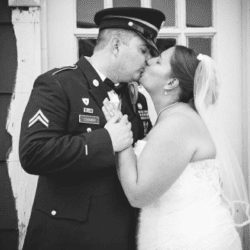The friendship and support that I have received from caregivers... reminds me I am not alone in this journey and I can reach out for support.
What does being a military caregiver mean to you?
It is humbling experience to be an important part of the support system that helps a person who has sacrificed so much for their country find a way to heal from the many visible and invisible wounds of war.
How has your life changed since you became a caregiver? What sacrifices have you had to make?
The biggest way that life has changed for me is the ability to adjust to the ever-changing notion of what is normal. It is hard to think of the actions I have made as sacrifices since it is a reality of everyday life and that I openly accepted in having a partnership with my veteran. Everything that I do that seems difficult is worth the hardships to help my veteran achieve a life that includes joy. With that said, some concrete ways that I have had to sacrifice in my role has been to limit activities outside the home, take a leave of absence from my teaching career, cancel trips/events, and attend many social gatherings alone.
What is one piece of advice you would offer to other military and veteran caregivers?
It is important to remember that the caregiver is an important role in helping military and veterans heal and the caregiver needs support in this endeavor. Remember to do self-care. I try to explain the difficulty at the start of the caregiver journey as trying to drive a car from the passenger seat. It is a difficult balance to try and let your care recipient have autonomy, while simultaneously being the point person to navigate difficulties. You need to lovingly move from the passenger seat to the driver seat, and take little trips just for you

My Story
Theresa Coomer of Paw Paw, Illinois, is a caregiver for her husband Marcus, a retired Army Corporal. Theresa’s biggest challenges as a caregiver have been in helping her husband cope with post-war battles with drug addiction and suicide.
Marcus is a purple heart recipient who was injured by an Improvised Explosive Device that struck his tank during a 2004 tour in Iraq. In addition to permanent damage to his spine, Marcus also suffered a traumatic brain injury (TBI). He currently experiences painful arthritic episodes, and symptoms related to post traumatic stress.
Theresa has been Marcus’ primary caregiver for the past 10 years. In addition to helping him with every day activities like cooking and cleaning, managing appointments and monitoring medications, Theresa can often be found advocating at the Department of Veterans Affairs (VA). In 2018, the couple welcomed their first child, a challenge even in the simplest of circumstances. Theresa and Marcus have been through so much in their life already that their fears of bringing a newborn into the family dynamics worried them, especially with a young toddler in the home already. Many military and veteran families struggle with the idea of how a baby will impact the veteran. It's stressful to think about more duties falling on the caregiver. Despite ample planning and a wonderful support system, the new parents are having a difficult time establishing a normal routine. Theresa has found crafts and cooking to be tremendous creative outlets and enjoys concocting new recipes for her husband to try.
As a teacher who is often forced to take leave to care for her husband, Theresa hopes to help address this common occurrence for military and veteran caregivers by advocating for more comprehensive assistance for caregivers and their dependents. As a Dole Fellow, Theresa is committed to finding new ways to support families like her own.








